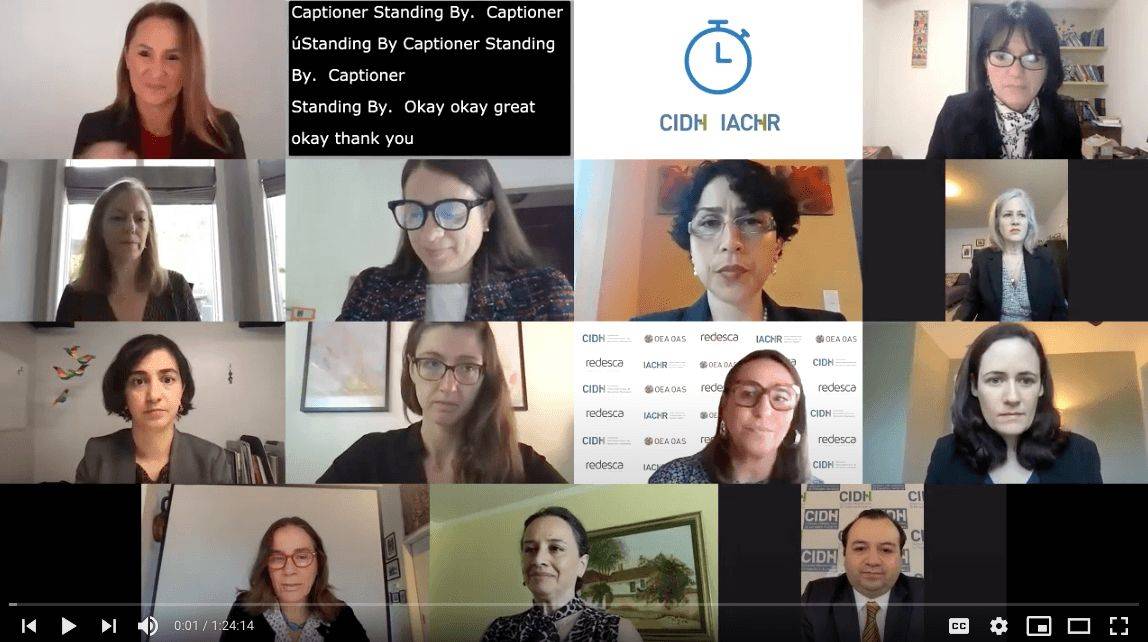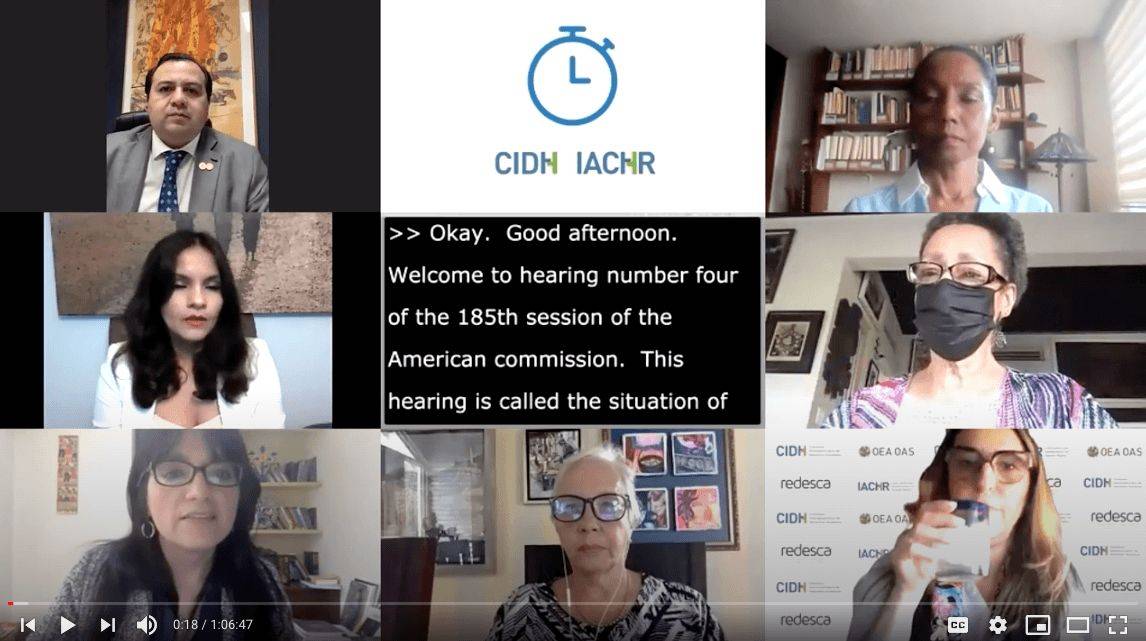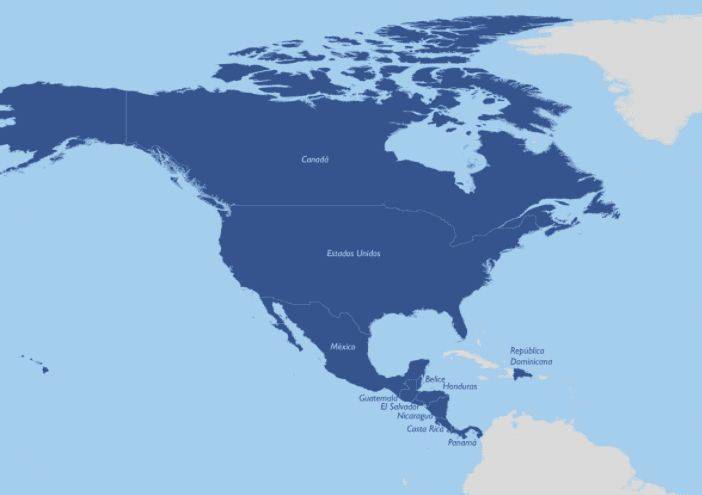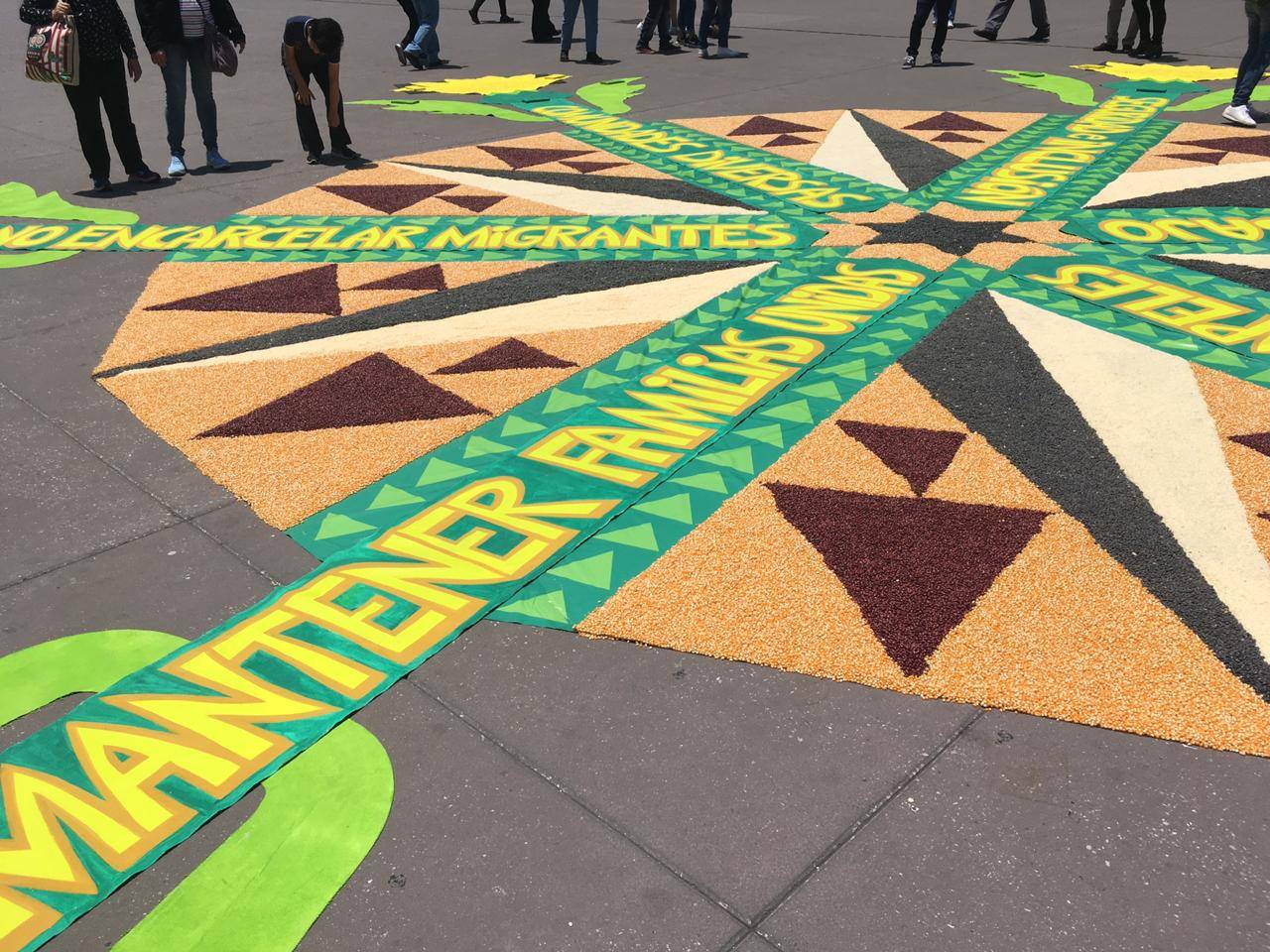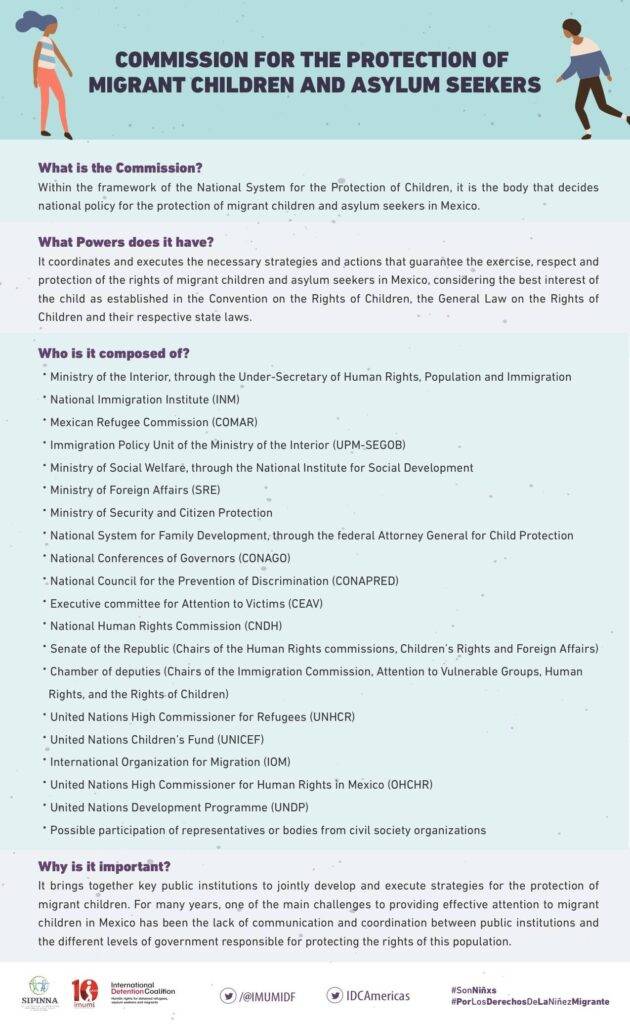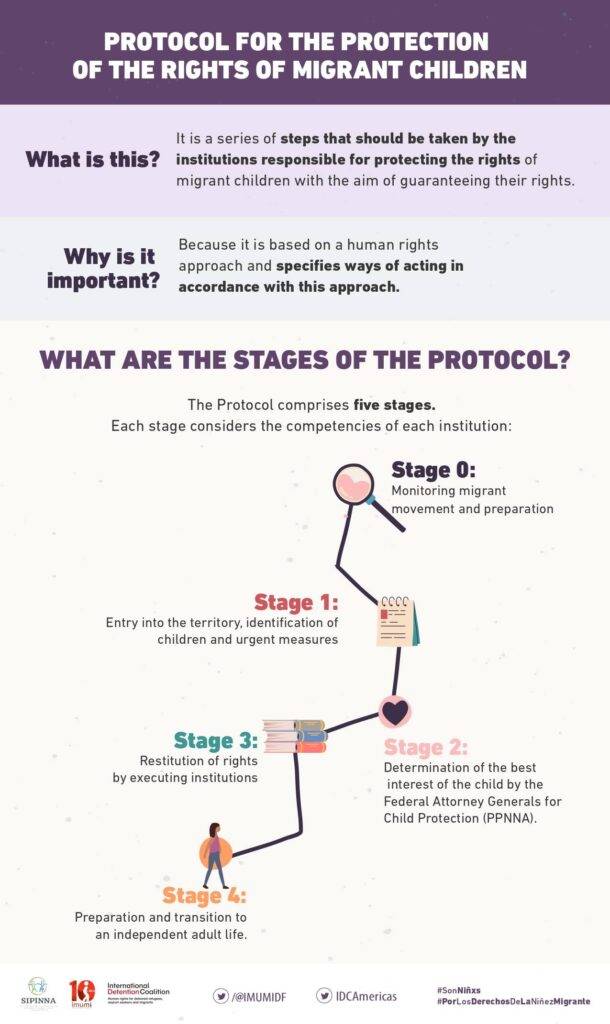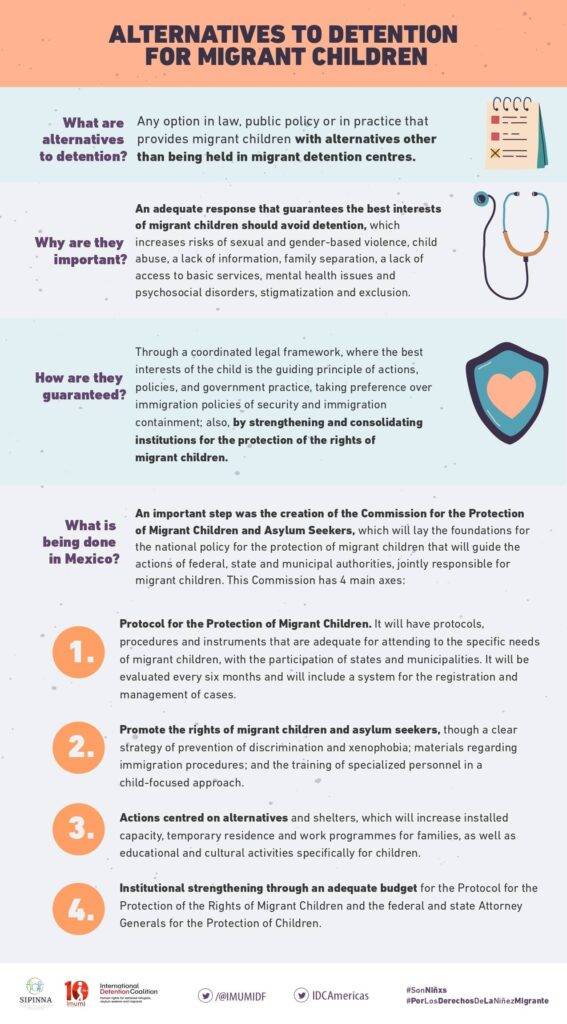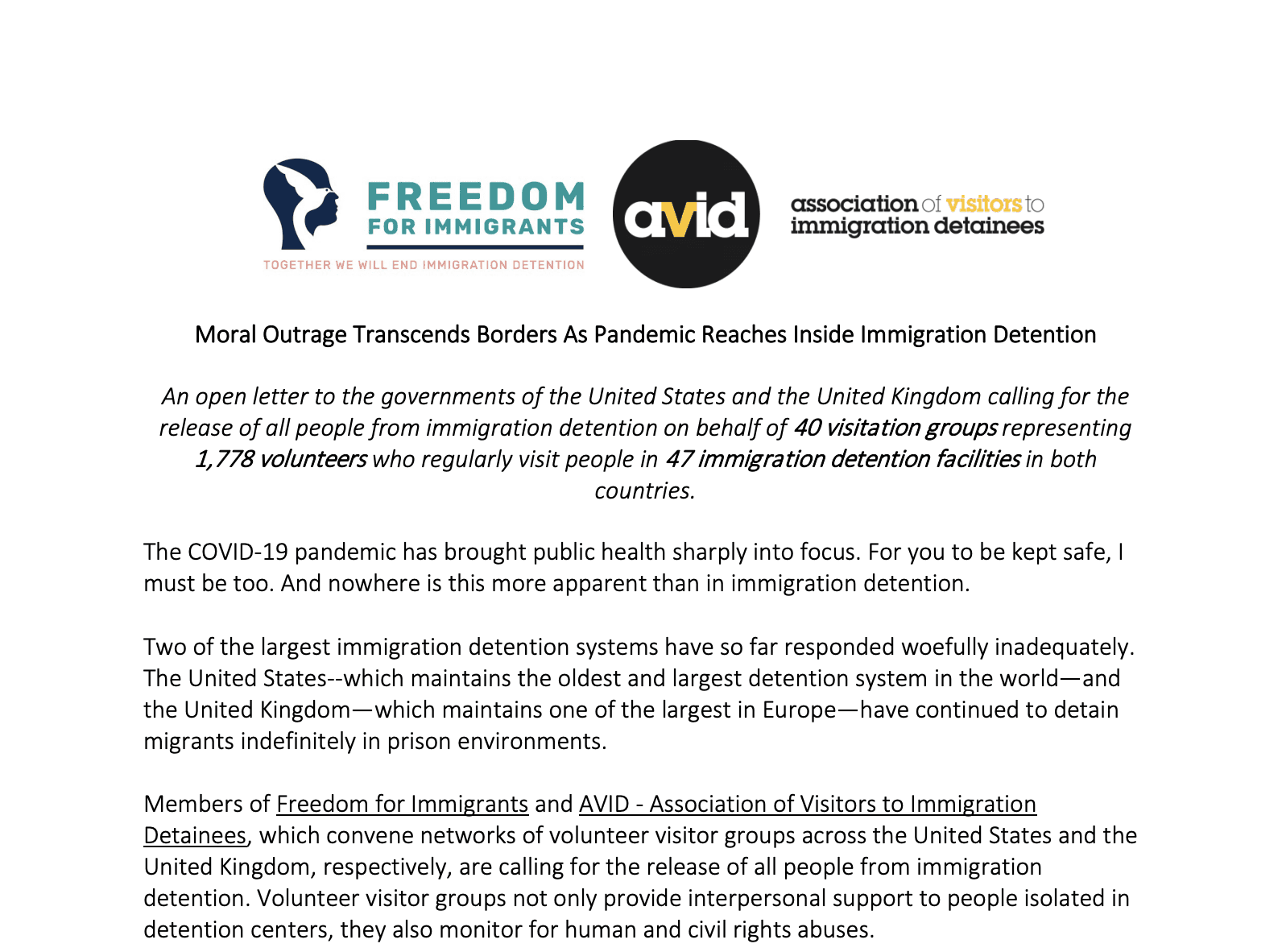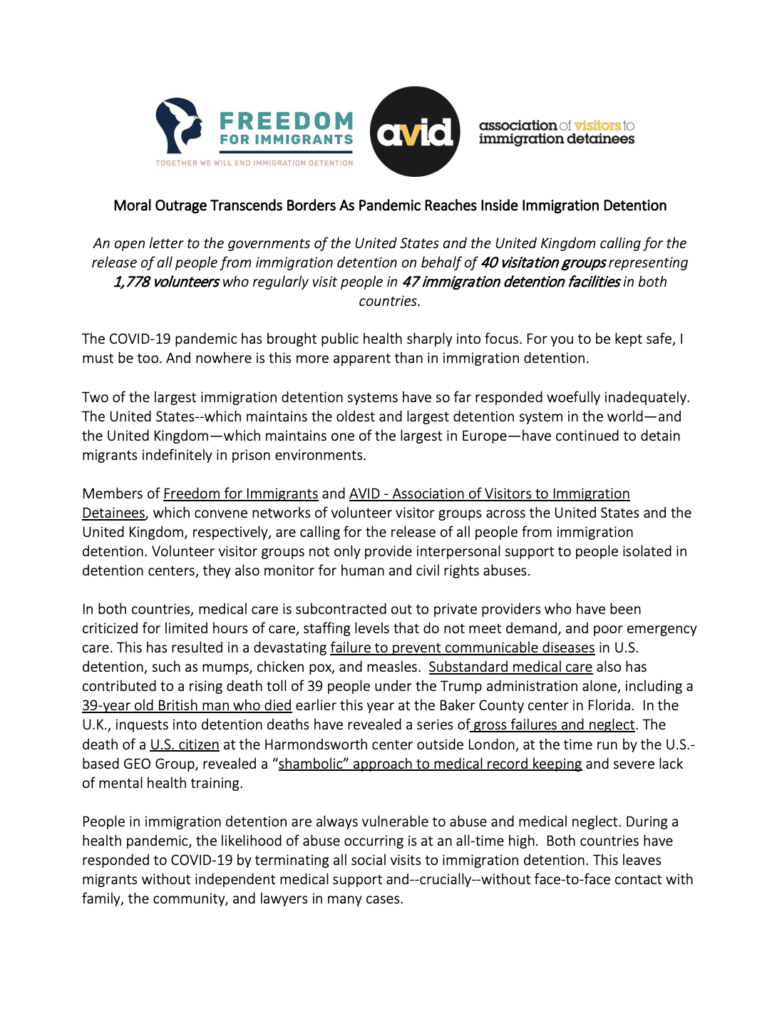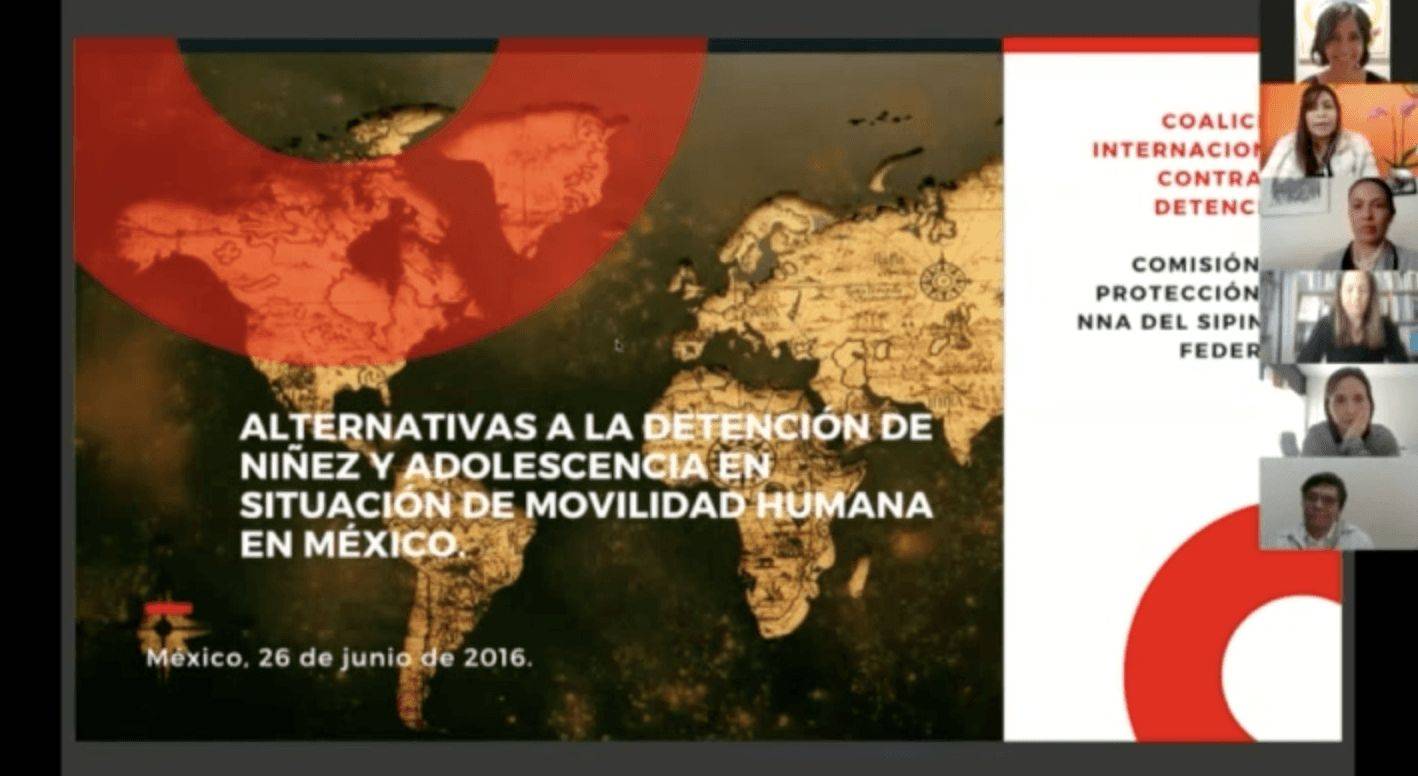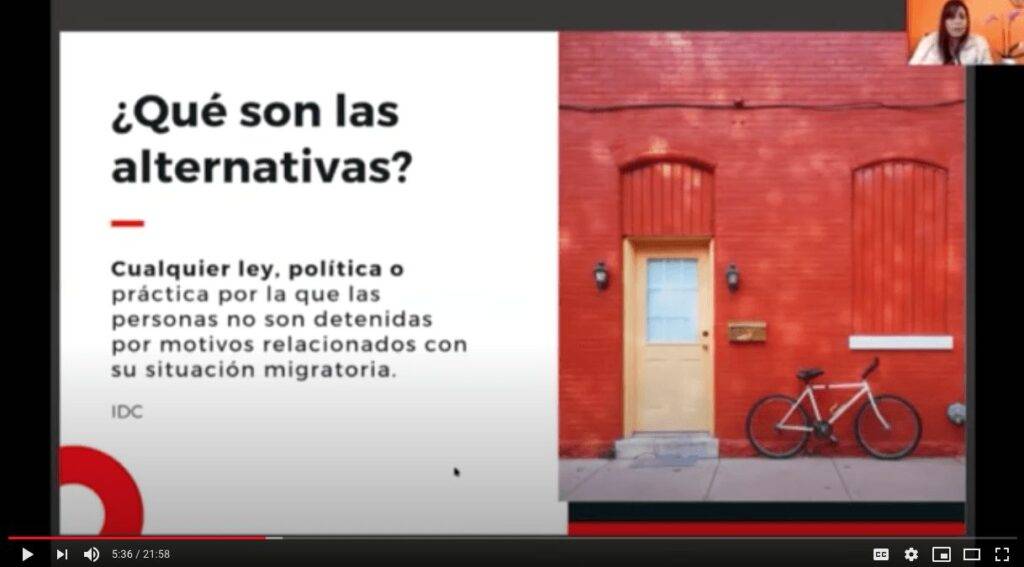Human Rights Situation of Migrants & Detention Centres in the USA
Written by Gisele Bonnici IDC Americas Regional Coordinator
A hearing before the Inter-American Commission for Human Rights (IACHR) in June included a civil society cohort of speakers from Project South, Detention Watch Network, and the Transnational Legal Clinic who highlighted abuse happening in detention centres in Georgia and across the United States, and spoke to the following violations of the American declaration and other rights declarations inherent in the US system of immigration detention:
- Right to dignity and security of person
- Right to health
- Right to freedom from forced labour
- Right to the protection of family life
- Right to due process
- Right to seek asylum
- Right to freedom of expression
- Right to non-discrimination
- Right to freedom from retaliation
A quote from a recent Center for Victims of Torture report was referred to ahead of the cohort’s requests of the IACHR: “The system of immigrant detention is inherently violative of the United States’ obligations under the Convention Against Torture (CAT) and other international human rights treaties and norms. It is not enough to talk of standards, as standards have done little to protect those taken into ICE custody and locked away in detention centres across the United States.” The cohort then called upon the IACHR to urge the United States to bring an end to immigrant detention.
The IACHR also heard directly from survivor of immigration detention Wendy Dowe, about the abuse and forced sterilisation she suffered at Georgia’s Irwin County Detention Center in 2018: “From the day I entered Irwin County, it was like I was in hell. The next person, the next woman, the next mother, the next child, does not have to go through this suffering that me and my family have been through. I’m asking for it to stop, for nobody else to go through this type of abuse.”
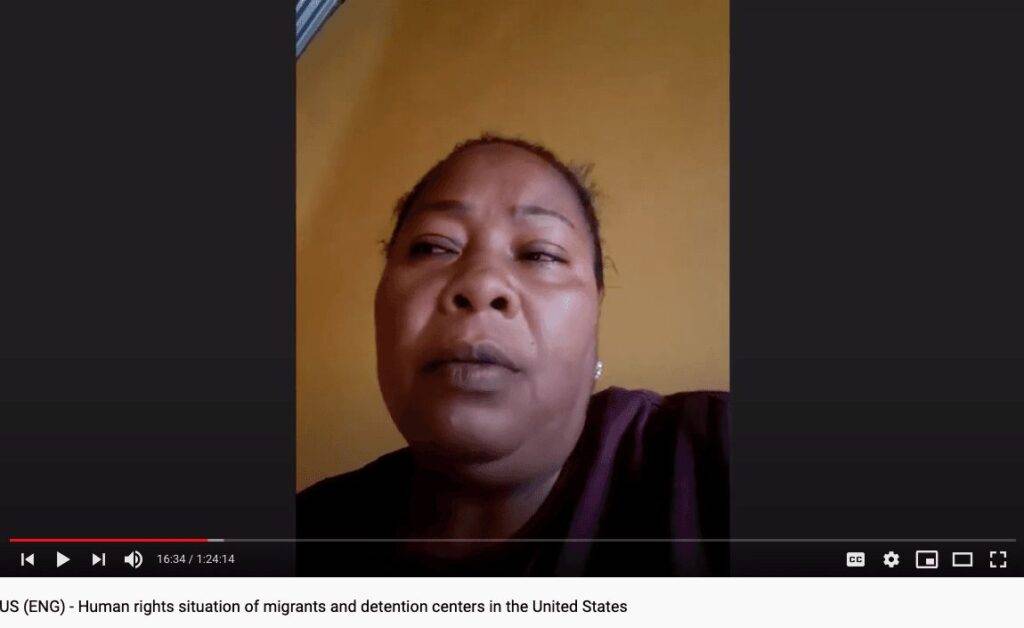
IDC’s member Detention Watch Network also shared concerning numbers including the expansion of the immigration detention system in the US over the past 20 years, which now includes over 200 detention centres and jails around the country that detain up to 500,000 people each year: “These experiences that you’ve heard should shock the conscious. Unfortunately these experiences are not unique to the state of Georgia. They are emblematic of the entire US immigration detention system, which is a part of the US system of mass incarceration that has a disproportionate impact on people of colour, and in particular on Black people.”
IDC stands in solidarity with its US members and partners in their work to end the immigration detention system in the US. View the hearing in full here.
The Situation of Migrants & Refugees in Trinidad & Tobago
Written by Denise Pitcher Caribbean Centre for Human Rights (CCHR) & Gisele Bonnici IDC Americas Regional Coordinator
IDC’s partner the CCHR was granted a hearing at the Inter-American Commission for Human Rights (IACHR) on the “situation of migrants and refugees and persons deprived of their liberties” in Trinidad and Tobago in June. CCHR Co-chair Dr. Carolyn Gomes and Executive Director, Denise Pitcher, presented on a number of human rights issues including refoulement, deportations, access to justice and immigration detention. Immigration detention in Trinidad and Tobago remains an urgent issue with inhumane conditions, overcrowding, lack of monitoring of detention facilities, prolonged detention without legal basis, children in detention, no separation of women and children from men in immigration detention and lack of transparency by the government about Covid-19 protocols. CCHR also highlighted that in spite of being a party to the 1951 Refugee Convention and its 1967 Protocol, Trinidad and Tobago does not have refugee legislation and thus there is no legal framework to guide how migrants and refugees are treated.
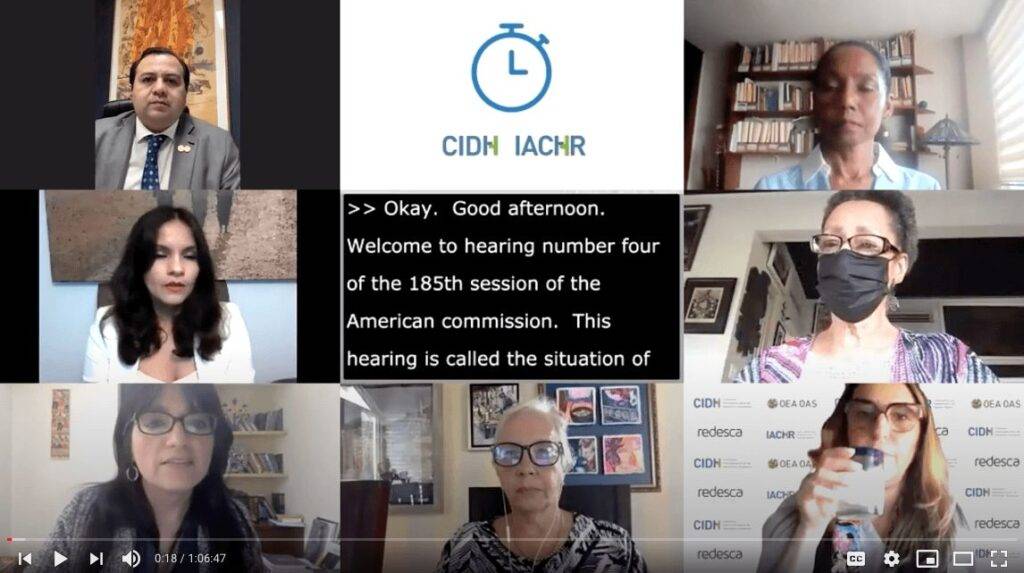
CCHR made several recommendations to the Commission in the hope of upholding the human rights of migrants and refugees and persons deprived of their liberties. These recommendations included:
- a request by the Commission for a country to observe the situation firsthand
- to establish a working group with both local and international stakeholders to clarify the details, roles and responsibilities in the draft refugee policy and oversee its implementation
The IACHR was grateful to receive this report and requested additional information to support any follow up actions they may decide to take. The Commission proposed as a first step, sending an Article 8 letter to the government of Trinidad and Tobago with a list of questions on aspects of the situation and promised to follow up with other actions within the scope of their mandate.
IDC congratulates our partner CCHR for their ongoing advocacy to protect the human rights of migrants and refugees in Trinidad and Tobago. View the hearing video in full here.
Regional Conference on Migration Advances Issues of Child Protection in the Americas
Written by Diana Martínez
During 2021, the Mexican government is serving as the pro tempore president of the Regional Conference on Migration (RCM). The RCM, also known as the Puebla Process, is a non-binding, regional consultative process that operates by consensus. It is a discussion space for member States seeking greater coordination, transparency, and cooperation on regional and international migration. As stated by the RCM itself, this multilateral forum fosters regional efforts to strengthen effective migration governance and protect the human rights of migrants, especially vulnerable groups such as children, as well as promotes alternatives to detention.
After a complicated year due to the COVID-19 pandemic in 2020, the RCM resumed regular work, virtually, and convened a Forum for Regional Dialogue of Processes for Migrant Child Protection on 20 and 21 April. This was a response to the challenges and vacuums identified in the inter-institutional coordination of the systems of protection for migrant children. The Forum sought to identify and systematise inter-institutional coordination experiences, actions and best practices that could be replicated or adopted by member States of the RCM to guarantee the effective protection of the rights of children in international mobility, as well as to address the challenges and opportunities of creating regional cooperation mechanisms for the protection of children within the context of human mobility.
International Detention Coalition was invited to the Forum as a panelist as part of the Regional Network of Civil Organisations for Migration (RROCM). This network is the civil society counterpart to the Regional Conference on Migration. IDC highlighted inter-institutional coordination in the implementation of processes for the integral protection of children, as in the Mexican case with the Commission for the Protection of Child migrants and asylum seekers of the System for Integral Protection (SIPINNA). This commission developed the Migrant Child Protection Protocol, a mechanism for coordinating between authorities, international entities and civil society organisations that seek to protect children in detention.
Participants in the Forum, representing member States of the RCM, shared best practices in matters of migrant child protection and agreed on the need to progress with a system of transnational protection.
On 12 May 2021, the RCM presented the Operative Guide for the Application of the Best Interest of the Child within the context of human mobility. This Guide is the result of years of work that formed part of the RCM’s Strategic Plan for the Liaison Officer Network for the Protection of Migrant Children and Adolescents 2017–2022, and serves as a reference for the implementation of mechanisms for best interest determinations of children.
The Guide recognises non-detention as a specific principle for the protection of children. As a first step, it calls for identification to detect and evaluate situations of vulnerability and considers detention centres as one of the places where this identification can occur. Furthermore, when undertaking an internal referral for preliminary identification and rapid evaluation of best interest, the principles of non-detention and no deportation need to be applied.
The steps or stages considered by the Guide for the evaluation of best interest include:
- designation of the person responsible for evaluation
- evaluation of conditions and needs
- design of a plan to manage cases of protection
- execution of case management plan
- follow-up and evaluation of plan execution
- closure of case or transfer to procedures for determining best interest
These efforts, together with others by the RCM in matters of child protection in the region, will be insufficient if they are not reflected in the national arena, and in the exchange of best practices. Furthermore, the guide for the determination of best interest should be adapted to the reality of each member State in order to advance towards a transnational system of protection that guarantees the rights of this population, including that of non-detention.
Tin Otoch Children’s Shelter: Sonora, Mexico
In recent years, International Detention Coalition in Mexico has been working with various local authorities towards implementing alternatives to detention for migrant children. The Sonora Attorney General for Child Protection is one such authority. When the “Tin Otoch” children’s shelter opened its door, it also paved the way for the state to implement alternatives to detention even before the law prohibiting child detention had been passed. With the approval of the law, the role of Tin Otoch gained momentum, not only as a shelter, but also for facilitating case management. In this article, the Sonora State Attorney for Child Protection, Lic. Wenceslao Cota Amador, shares the efforts that have been made to eliminate migrant detention for children in the state.
Written by Lic. Wenceslao Cota Amador
Sonora State Attorney General for Child Protection
The State of Sonora, Mexico, is located in the north-east of the country and shares a more than 580-kilometer border with the United States. It is thus considered a transit and shelter area for migrants, among whom are national and foreign, accompanied, and unaccompanied children. Their motives and circumstances for crossing the border may vary, but all require protection of their human rights.
The Sonora Government has designed and implemented solid public policies aimed at guaranteeing the protection of the human rights of migrant children. Since 2004, with the implementation of the “Camino a Casa” (Way home) program by Sonora’s System for the Integral Development of the Family (DIF), Mexican children deported from the United States have been offered protection and provided with residential foster care in a Center for Social Assistance. Here, their food and clothing needs are met, and psychological and legal support are provided. The program works towards family reunification, in collaboration with DIF offices in other states, mainly Guerrero, Chiapas, Tabasco, and Oaxaca, among others. This program has operated with public resources from the Sonora State Government and has secured alliances to professionalise work teams in matters of the protection of human rights in accordance with national and international laws that recognise and promote respect of the rights of migrant children.
The DIF Sonora’s “Camino a Casa” program currently attends to more than 70,000 national, unaccompanied children, and has become a consolidated policy within the context of the risks confronting children, young people, and families in the country.
Claudia Pavlovich Arellano’s government is committed to reorienting public and human resources, as well as infrastructure to strengthen public policy regarding the protection of the rights of foreign, accompanied, or unaccompanied migrant children, in accordance with the General Law for the Rights of Children, passed in 2014, that recognises children as subjects of human rights. The state governor has created strategic alliances (with the Howard G. Buffet Foundation) to build a model of open door residential foster care; and worked with international organisations to establish its foundations, based on concepts and principles such as the superior interest of the child, no detention, a multidisciplinary approach to childhood, and family reunification, among others.
In August 2018, the Sonora DIF Center was opened. “Tin Otoch” (“My home” in Mayan) is based on a model that restores children’s right to health and recreation through occupational projects, such as: music, sport, handicrafts, environmental care, art therapy, and workshops on resilience. The model has become a reference at both a national and international level.
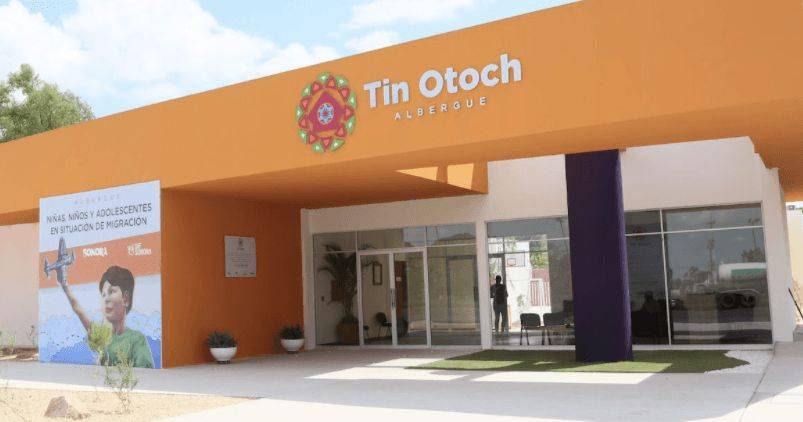
Since its opening, the center has attended to more than 500 accompanied and unaccompanied children, predominantly from Guatemala, Honduras, and El Salvador. Its work is based on manuals and protocols that have been developed with a human rights focus, and guarantees specialised, multidisciplinary attention guided by the best interests of the child and aimed at family reunification or asylum applications. This is done through the work of the State Attorney General for Child Protection.
Our vision and focus aim to provide alternatives to detention during the course of administrative processes. This has meant that interviews are no longer conducted in immigration offices, but rather, in “Tin o Toch” by multidisciplinary teams, guaranteeing that children’s opinions are heard and providing them with a framework in which to freely express emotions, fears and expectations. Children who have passed through the center have the following levels of schooling: 53% primary school studies; 29% secondary; 9% high school; 1% incomplete bachelor degrees; and 10% have no schooling.
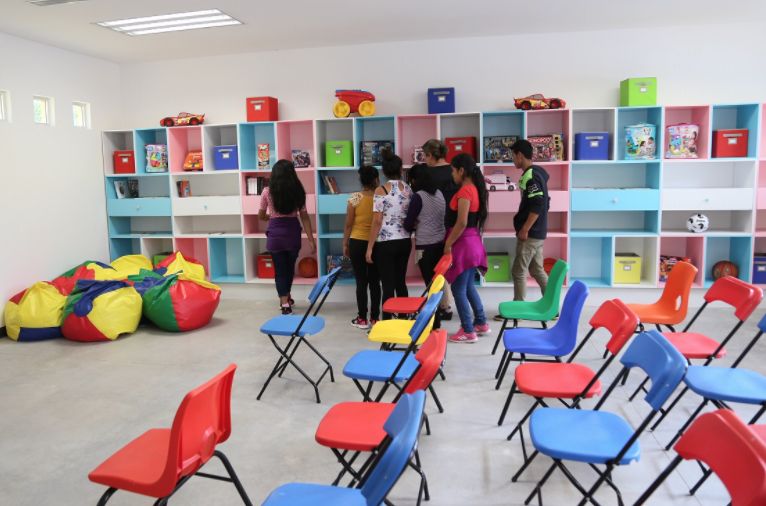
The main destination points in the United States are California, Texas, New York, and Florida. Family reunification is the primary motivation for migration, followed by abuse or domestic violence.
Teams from both the offices of the Attorney General on Child Protection as well as the Center have undergone extensive professionalisation on providing integrated, human rights focused attention, and have worked in a strategic alliance with International Detention Coalition in Mexico to strengthen work mechanisms and the accompaniment of children.
The Sonora DIF, under the coordination of Karina Zárate Felix, has developed mechanisms of collaboration based on alternative care models (residential foster care, foster families, family reunification) for migrant children, ensuring successful experiences where the right to family life has been guaranteed for accompanied and unaccompanied migrant children.
We face great challenges, but are committed to working in collaboration with government, national and international organisations, families, and communities to ensure the rights of children are respected and that children feel protected in their transit through Sonora, regardless of nationality or origin.
US Advocates Shift the System in 2021
Written by Gisele Bonnici, IDC Americas Regional Coordinator
IDC recognises the critical political shift that our US members and partners are navigating as we move into second gear in 2021. We stand with you in solidarity as you take action and opportunity to ensure dignity and humanity for refugee and migrant communities.
This January saw a daily average of 14,195 people held in immigration detention in the United States, the lowest in over 20 years, due to border closures, the asylum ban and expanded fast-track deportations. The significant drop has highlighted the arbitrary and unnecessary use of immigration detention that advocates have documented for decades.
President Biden's opening executive actions in January, followed by initial steps to restore asylum processing on the US-Mexico border and the formal introduction of the US Citizenship Act of 2021 to Congress, are an encouraging move towards preventing the expansion of immigration detention. The most recent action to open up two detention facilities for migrant children, however, is of grave concern. IDC fully agrees with our US members and partners that so much more is urgently needed to dismantle the system, including an immediate closure to the worst identified immigration detention centers especially those locking up families and children, immediately ending private detention contracts and the harmful collaboration between immigration authorities and local law enforcement. Guided by numerous recommendations made to the new US administration by organisations like the American Civil Liberties Union, Freedom for Immigrants, Women's Refugee Commission and Detention Watch Network, among others, positive policy reform of the immigration enforcement system can swiftly reduce the number of people harmed by immigration detention even further.
The dedicated and vocal work of US advocates at this time gives us collectively as a coalition and as a global movement, a huge opportunity to advocate for the end of immigration detention and a genuine shift to migration governance that prioritises engagement and well-being and invests in community-based alternatives.
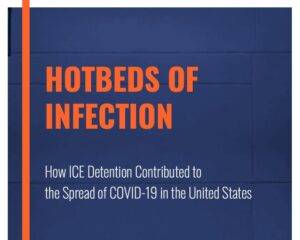
Compelling new evidence of the high risk to the lives of migrants in the US detention system and the collective public health threat posed by immigration detention make the need for positive policy reform more urgent than ever. Both the Detention Watch Network's Hotbeds of infection: How ICE Detention contributed to the Spread of COVID-19 in the United States, and a recent study by a multi-institution team Preventing the Spread of COVID-19 in Immigration Detention Centers Requires the Release of Detainees make an unequivocal call for the safe release of those in immigration detention in the United States into their communities. The impact of COVID-19 has heightened the severe harm of a migration governance system centered around locking people up rather than enabling engagement and integration of migrants and refugees through community programming.
“Human rights abuses and medical neglect could be avoided if those navigating immigration cases were able to do so at home with their families and in their communities, not behind bars.”
Detention Watch Network
IDC joined a broad campaign of over 200 organisations spearheaded by Freedom for Immigrants and Detention Watch Network, calling on the new US administration to immediately release people in Immigration and Customs Enforcement (ICE) custody amid the COVID-19 pandemic and cease all enforcement actions, deportations, and transfers between immigration detention facilities and from local, state, and federal jails and prisons into immigration detention. We invited you to read the letter here and to join the movement to #FreeThemAll.
In early February, US activists including the UndoduBlack Network, Black Immigrant Collective, African Communities Together among others, commemorated Black History Month by launching a Black Immigrant Advocacy Week of Action #Act4BlackImms to highlight the cruel and disproportionate impact that ICE immigration enforcement has on Black immigrants, and calling on the Biden administration to intentionally address systemic anti-Black racism within the asylum and migration systems. In particular, they call for an end to the increased deportations to Haiti and the designation of Temporary Protective Status or Deferred Enforced Departure with work authorisation for persons from Cameroon and Mauritania to prevent placing lives at great risk, and as protective measures against their detention and deportation.
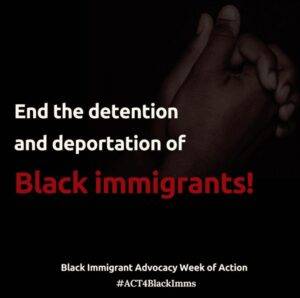
Advocates at national and local levels, including case managers and legal advisers, agree that existing government-sponsored alternatives to detention programming fall short of being effective in critical ways, such as their conception process and focus. A move away from enforcement priorities is urgently needed within the design of alternative programs, so that the use of immigration detention is truly reduced rather than expanded under a different name.
Studies continue to show the positive impact of alternatives, including benefits in terms of operating costs, case resolution, and particularly, the protection of rights, well-being and early community integration. These benefits will become even more apparent as we move towards a new emphasis on programs centered on empowerment through access to individual support, rights, and engagement-based immigration processes. Further recommended reading on US alternative to detention programs:
- The Real Alternatives to Detention
- Making the Case for Ending Immigration Detention
- Latest evidence for ending family detention
- A better way: Community based programming as an alternative to immigration incarceration
Advocates identify key opportunities to move advocacy forward in this regard. Firstly, community organisations are already providing effective, humane alternatives. US advocates would like to see congressional leaders directing more investment to community programming, such as community-based case management services and the expansive network of non-profit organisations providing medical, legal, and other social services to immigrant communities. Secondly, the overwhelming and proven positive impact of access to legal counsel on case outcomes supports the need for government-funded legal representation. Finally, as we move away from the prevalence of enforcement-based alternatives to detention programs, we need to look beyond effectiveness indicators that focus solely on compliance, towards developing programs that incorporate metrics that evaluate well-being.
IDC joins our members and partners working towards the goal to see the establishment of a new comprehensive migration framework that does not depend on immigration detention, nor other enforcement-based procedures that amount to alternative forms of detention. IDC commits to this vision by supporting the development of widespread and inclusive alternatives to detention programs that are rights-based, engagement-based, community-based, and also incorporate effective and independent case management mechanisms to support case resolution and durable futures for migrant and refugee communities in the United States.
Law Reform Opens the Door to Effective Implementation of the National Protocol for the Protection of Migrant Children

- From January to August 2020, the INM registered the detention of 7,442 migrant children.
- On 29 September, the Mexican Congress approved reforms to the Migration Law and the Law on Refugees, Complementary Protection and Political Asylum in accordance with the provisions of the General Law on the Rights of Children and in order to guarantee that migrant children will not be held in detention.
Mexico City, 12 October 2020.- The International Detention Coalition (IDC) and the Institute for Women in Migration (IMUMI) recognize the legislative progress to guarantee the rights of migrant children by harmonizing the Migration Law (LM) and the Law on Refugees, Complementary Protection and Political Asylum (Law on Refugees) with the General Law on the Rights of Children. Within this context, we are launching an information campaign to highlight the progress and positive practices achieved on a federal and state level regarding alternatives to detention and alternative care models that guarantee the best interests of migrant children.
The legislative reforms of 29 September prohibit the detention of children as a result of their migration status, and transfer responsibility for guaranteeing the wellbeing of this population from the National Migration Institute (INM) to the National System for the Protection of Children, thereby recognizing the rights of children above their migration status.
During 2019, more than 50,000 migrant children were detained, mainly from Honduras and Guatemala. These figures are unprecedented in the 17 years that the Ministry of the Interior has published statistics on immigration detention. Detentions increased by 82% in comparison with 2018. Between January and August 2020, 7,442 detentions of migrant children were registered, 37% of whom were girls and 63% boys, despite the health emergency, and the social distancing and hygiene measures implemented by the Mexican government to combat the pandemic, and in violation of a federal judge’s order to halt the detention of migrant children in detention centers.
The state has the obligation to protect migrant children. The detention of migrant children has repercussions on their psychosocial development in the short, medium, and long term. Non-custodial, community-based alternatives to detention provide migrant children with different options that guarantee their best interests according to their specific needs.
In recent years, Mexico has instituted public policies to protect and guarantee the rights of children from before their entry into the country and during their stay in Mexico. The Commission for the Protection of Migrant Children and Asylum Seekers was created within the framework of the National System for the Protection of Children. This entity is responsible for dictating national policy for the protection of migrant children and asylum seekers in the country, including the National Protocol for the Protection of Migrant Children, which mandates protocols, procedures and instruments to attend to the specific needs of each migrant child.
Today, federal, state and municipal authorities need to commit to the implementation of the National Protocol for the Protection of Migrant Children that guarantees the best interests of the child; the publication of the reforms to the LM and the Law on Refugees in the Official Federal Gazette; as well as to the allocation of sufficient federal and state budget to strengthen the Attorney Generals for Child Protection and the public and private Centers for Social Assistance.
Migration, regardless of the forms of movement or reasons, is rooted in the need for structural change and not acts of deterrence. Regardless of the risks involved or restrictive immigration policies, people will continue to flee from gangs, cartels, gender violence, poverty, and threats against their lives and those of their families. In the current context of the pandemic and given that the recent reforms have not yet come into effect, a continued policy of criminalization of migration increases the threat of detention for children and their risk of contracting coronavirus in detention centers.
Media Contacts:
Diana Martínez Medrano
International Detention Coalition
Cell. 55 7111.4786
Miriam González Sánchez
Instituto para las Mujeres en la Migración, AC
Cell. 55 3733.5819
Mexican Congress Affirms the Rights of the Child
Last Thursday 29 September, all 389 members of the Mexican Congress unanimously declared that immigration detention is no place for children. This historic political moment came to fruition following more than a decade of multi-level advocacy, and collaboration between civil society organisations, international partners, government authorities, and communities.
Mexico has long struggled with the moral contradiction of detaining tens of thousands of migrant and refugee children - mostly from Central America - while simultaneously taking a leading role in regional and international negotiations to end immigration of children and mandate non custodial community-based alternatives. In 2018, the Mexican government led the drafting and lobbying of these breakthrough commitments under the Global Compact for Migration and subsequently established the Working Group on Alternatives to Detention for Children under the Migration Policy Unit of its Interior Ministry.
Representative Nayeli Arlen Fernández Cruz: “Harmonization of the Migration and Refugee Laws pertaining to migrant children with the provisions of the General Law on the Rights of Children, is fundamental to guarantee that no minor child is detained arbitrarily in any of our country's immigration detention centers...In this way, we respond to the international recommendations on the deprivation of liberty of children for migration reasons, on the understanding that determinations on the best interests of the child will be entrusted to an authority other than the migration authority.”
The first important shift came in 2014, on the heels of a pioneering collaboration in joint advocacy by migrant and child rights groups in Mexico. This collaborative work involved key partnerships with UNICEF and UNHCR, IDC´s Global Campaign to End the Immigration Detention of Children, hearings before the Inter-American Commission on Human Rights, as well as clear recommendations to Mexico from the IACHR and the United Nations Committee on the Rights of the Child. New legislation in 2014 established a national protection system for all children, regardless of their immigration situation, along with regulations that specifically prohibited their confinement in immigration detention centers.
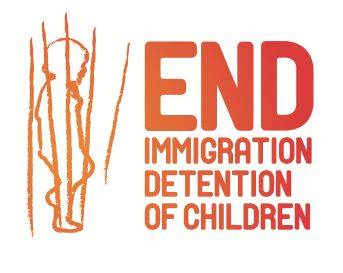
The 2014 legislation opened up opportunities for collaboration with immigration authorities in the successful first alternative to detention pilot, and follow-up programs that demonstrated how children and families can be supported to live in the community as they participate in their ongoing migration or asylum process.
As reform to the immigration law lagged in keeping up with these important policy changes, critical obstacles remained to guaranteeing the right to freedom for migrant and refugee children in Mexico. In 2018, IDC members outlined opportunities for Mexico's new administration to strengthen alternatives that would limit the use of immigration detention. This included investing in joint programs between authorities and civil society that would uphold migrants’ rights while also meeting state requirements. Meanwhile, instances of immigration detention of children soared exponentially over the past three years, and even under 2020 pandemic conditions, over 90% continue to be deported to their countries of origin, without proper screening or adequate assessment of their best interests.
Throughout this time, IDC and our members Asylum Access Mexico, Instituto de las Mujeres en la Migración, and many others, actively engaged in the Migration Policy Working Group (Grupo de Trabajo sobre Política Migratoria), to lobby and train legislators on the urgent and important nature of the law reform proposals before the Mexican Congress. Last week´s unanimous decision is a testament to the strength of those who believe that Mexico can indeed close the gap between discourse and reality, and safeguard the lives of thousands of migrant and refugee children fleeing Central America in search of peace and security.
Gisele Bonnici, Americas Regional Coordinator, IDC: “Working side by side with our dedicated partners in Mexico, IDC will continue to promote and support practical implementation of effective and appropriate alternatives for migrant and refugee children. Our goal is that no child, whether travelling accompanied or unaccompanied, be detained for any period of time for immigration reasons.”
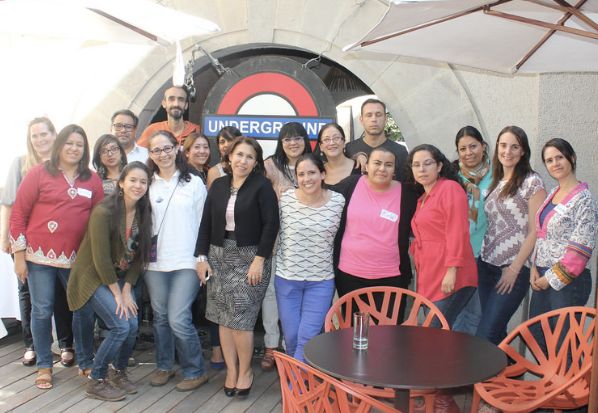
Mexico's new legislative commitment to end the immigration detention of children will demand effective, resourced, and just implementation across the country. It will mean that national immigration authorities no longer are charged with responsibility for decisions regarding migrant children; this will now rest exclusively with national child protection authorities, who are best placed to ensure their welfare in accordance with their best interests.
In this respect, IDC commends the positive progress embodied in the adoption of the National Protocol for the Protection of Migrant Children and the important efforts to strengthen coordination and implementation at state and local levels. These actions constitute solid policy foundations upon which to build a national referral system for migrant and refugee children in Mexico that includes screening, assessment, and placement in alternative care models with appropriate case management processes. IDC currently holds a seat on the national Commission for the Protection of Migrant Children and provides technical guidance for state level implementation of the Protocol to the states of Baja California, Coahuila, Sonora, San Luis Potosi, Zacatecas, Jalisco, Tlaxcala, Chiapas, and others. With little resources, IDC and partners have been able to support the development of ground-level structures to protect migrant children, such as alternative care models, and create processes for authorities to share methodology, strategy and learnings.
IDC is a global organisation with a localised worldview, and we look forward to continuing our work with local partners, including Mexican authorities, UNICEF, UNHCR, IOM and other agencies, to ensure the budget and structures are in place to fulfil this new and critical legislative mandate.
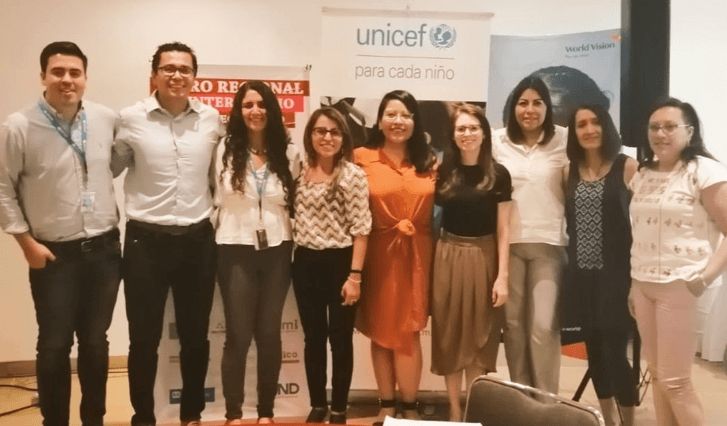
Volunteers Transcend Borders in Moral Outrage
The risks immigration detention poses on the health and well-being of migrant and refugee populations is the most important reason why IDC strives to build movements to reduce immigration detention and implement non-custodial community-based alternatives. The potential impact of detention on the mental and physical health of those detained is so severe that its use as a message of deterrence, immigration control or as a blanket response to groups of migrants cannot be justified. The response of some of the world's principal detaining countries over the past few months has brought this reality into focus.
The United States and the United Kingdom are just two of these countries that have so far continued to detain migrants indefinitely in prison environments throughout the pandemic, responding woefully inadequately to issues of public health in immigration detention. With the US representing the oldest and largest detention system in the world and the UK maintaining one of the largest in Europe, this August IDC partners, Freedom for Immigrants and AVID - Association of Visitors to Immigration Detainees (which convene networks of volunteer visitor groups across the US and the UK, respectively) sent an open letter on behalf of 40 visitation groups to both governments calling for the release of all people from immigration detention.
Representing 1,778 volunteers who regularly visit people in 47 immigration detention facilities in both countries, these community advocates joined together across two continents in moral outrage at the continued detention of migrants and refugees in the face of verified reports of substandard medical care by private contractors, poor emergency care, gross failures and medical neglect, failure to prevent communicable diseases, and severe restrictions in on-going detention, such as ad hoc quarantines and solitary confinement, leading to a devastating impact on mental health including hunger strikes and mass harm.
Our concern regarding the consequences that state policies have on the health and well-being of people impacted by and at-risk of immigration detention is exacerbated by the fact that both the US and UK governments have responded to Covid-19 by terminating all social visits and limiting communication with the outside world. This leaves migrants without independent medical support, face-to-face contact with family, community and lawyers in many cases.
According to Freedom for Immigrants, the right to receive visits in immigration detention is an emerging international norm and the European Union has begun to protect this right. However, most countries in the world do not recognize this right and the operation of visitation programs is almost always entirely in the discretion of an individual detention facility. The volunteer visitation groups convened by Freedom for Immigrants and AVID not only provide crucial interpersonal support to people isolated in detention centers, they also monitor for human and civil rights abuses and promote government accountability in many areas, including detainee health and well-being.
It is through these important and unique programs that organizations like Freedom for Immigrants and AVID receive reports of widespread instances which show it is impossible to comply with public health guidance inside detention. In this time of a global pandemic, the only way to ensure that the hundreds of thousands of people needlessly detained do not contract Covid-19 is to facilitate their release.
Join IDC, Freedom for Immigrants and AVID in calling for the safe, timely and managed release of all detained migrants into the care of their communities.
Read and share the open letter
#StartWith1Visit
#FreeThemAll
#ThereAreAlternatives
For further information, please contact Christina Fialho at Freedom for Immigrants, [email protected], and Ali McGinley at AVID, [email protected].
ATD for Migrant Children in Mexico
Over the past few months, IDC has participated in discussions with the local authorities of various Mexican states regarding strategies for alternative care, aimed at strengthening the local implementation of the Migrant Child Protection Protocol.
This was done through the Commission for the Protection of Migrant Children and Asylum Seekers. In this video, Diana Martínez, Americas Programme Officer, explains the concept of alternatives to detention and its relation to alternative care for migrant and refugee children. She also presents experiences from other parts of the world, which were identified by IDC as good practices.
(Available in Spanish)
Opportunities Amidst the Pandemic
Preventing the detention of migrant children through local coordination of a national protection route
The government of Mexico ended 2019 with a huge debt due to depriving 51,999 migrant children of their liberty, a 77.7% increase compared to the previous year. In response to the prohibition contained in the Regulations of the General Law on the Rights of Children and Adolescents, which states no minor under the age of 18 shall be detained for migratory reasons, the Commission on the Protection of Migrant Children and Adolescents (Protection Commission) began 2020 with a plan to implement the recently created Protection Route for Children and Adolescents in a Mobility Situation, with the support of civil society members of this commission.
Although the health emergency interrupted the progress in coordination and implementing priorities, as in many countries, the use of technology has allowed the continued coordination of care and advocacy of civil society organisations to gain the right to personal freedom for migrant children and adolescents. The Protection Commission adjusted and reorganised its work to account for the health emergency, while also implementing the urgent Protection Route throughout the 32 states in the Mexican Republic. This was done with the central aim to not use immigration detention, and to provide referrals to several models of alternative care focused on case management.
Covid-19 caused sudden full migration stations in Mexico, including the presence of migrant children and adolescents. Unfortunately, they were not freed by immigration authorities into emerging programs on alternatives to detention; instead, many were transferred to their countries of origin, whenever border restrictions permitted. Faced with this worrying scenario, the Protection Commission launched a virtual conversations program aimed at listening to the needs of state authorities, and local civil society organisations to create a national response to the pandemic. Furthermore, the ultimate purpose was to make sure each state established a similar commission tasked with implementing the Protection Route, and the promoting alternative care models for migrant children and adolescents.
The first conversations session had nationwide reach with over 140 participants, mostly child protection, migration and asylum authorities who spoke about the recommendations issued by international bodies on effective protection of migrant children and adolescents in the context of Covid. IDC shared the Recommendations of the Working Group on Alternatives to Immigration Detention of the United Nations Network on Migration, which seek to ensure the health of people in human mobility situations who are detained or at risk of being detained. These recommendations include: ending immigration detention, adopting moratoriums on the use of immigration detention, and increasing non-custodial alternatives to immigration detention.
This conversation session has been followed by more exchanges with local authorities in the states of Chiapas, Baja California and Coahuila, which emphasised the need for better coordination among child protection authorities and immigration and asylum authorities. Better coordination will ensure that children and adolescents in mobility situations are not deprived of their liberty at migration stations. Some alternative care models have been presented during these session, and civil society has shared the obstacles to adopting the Protection Route, with an emphasis on case management. This will be followed by conversation sessions with the states of Tlaxcala, Sonora and others.
Mexico continues to face significant challenges to protect children and adolescents in a mobility situations, such as the difficulty of coordinating authorities. There are over one thousand protection authorities in the country with powers to care for migrant children and adolescents. Additional difficulties include lack of resources, and the power conferred by law to immigration authorities to place children and adolescents in migration stations prior to being referred to protection officials.
The efforts made by the Protection Commission, supported by IDC and its member and allied organisations, has led to the possibility of developing effective models, establishing coordination mechanisms, and generating data and evidence on better care for children and adolescents. At its core, this is about ensuring the freedom of this population, and making referrals to alternative care models that allow them to live in the community, and with the support of various entities that enable the fulfilment of their human rights.
